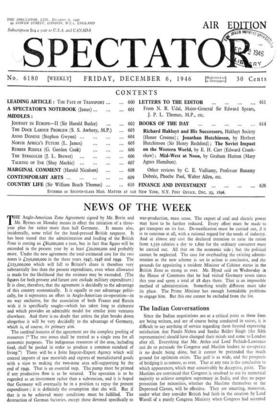NEWS OF THE WEEK
THE Anglo-American Zone Agreement signed by Mr. Bevin and Mr. Byrnes on Monday means in effect the initiation of a three- year plan for rather more than half Germany. It means also, incidentally, some relief for the hard-pressed British taxpayer. It has been stated that the administration and feeding of the British Zone is costing us £8o,000,000 a year, but in fact that figure will be exceeded in the present year by at least f2o,000,000 and probably more. Under the new agreement the total estimated cost for the two zones is £250,000,000 in the three years 1947, 1948 and 1949. The £125,000,000 which will fall to Britain's share is therefore very substantially less than the present expenditure, even when allowance is made for the likelihood that the estimate may be exceeded. (The figures for both present and future cost exclude military expenditure.) It is clear, therefore, that the agreement is decidedly to the advantage of this country economically. It is equally to our advantage politi- cally, for it represents an effort in Anglo-American co-operation—in no way exclusive, for the association of both France and Russia with it is specifically sought—which has taken long to elaborate and which provides an admirable model for similar joint ventures elsewhere. And there is no doubt that unless the plan breaks down altogether it will be very decidedly to the advantage of Germany, which is, of course, its primary aim.
The cardinal features of the agreement are the complete pooling of resources (" The two zones shall be treated as a single area for all economic purposes. The indigenous resources of the area, including food, shall be pooled in order to produce a common standard of living.") There will be a Joint Import-Export Agency which will control imports of raw materials and exports of manufactured goods with a view to making the two-zone area self-supporting by the end of 1949. That is an essential step. The pump must be primed if any productive flow is to be secured. The operation is to be regarded as an investment rather than a subvention, and it is hoped that Germany will eventually be in a position to repay the present expenditure ; it is definitely the assumption that she will. But if that is to be achieved many conditions must be fulfilled. The destruction of German factories, except those devoted specifically to
war-production, must cease. The export of coal and electric power may have to be further reduced. Every effort must be made to get transport on its feet. De-nazification must be carried out, if it is to continue at all, with a rational regard for the needs of industry. And at almost any cost the declared intention to raise the ration from 1,550 calories a day to 1,800 for the ordinary consumer must be carried out. All that on the economic side ; but the political cannot be neglected. The case for overhauling the existing admini- stration as the new scheme is set in action is conclusive, and the grounds for appointing a resident Minister of Cabinet status in the British Zone as strong as ever. Mr. Hynd said on Wednesday in the House of Commons that he had visited Germany seven times this year and spent a total of 28 days there. That is an impossible method of administration. Something totally different must take its place. The Prime Minister has enough formidable problems to engage him. But this one cannot be excluded from the list.


































